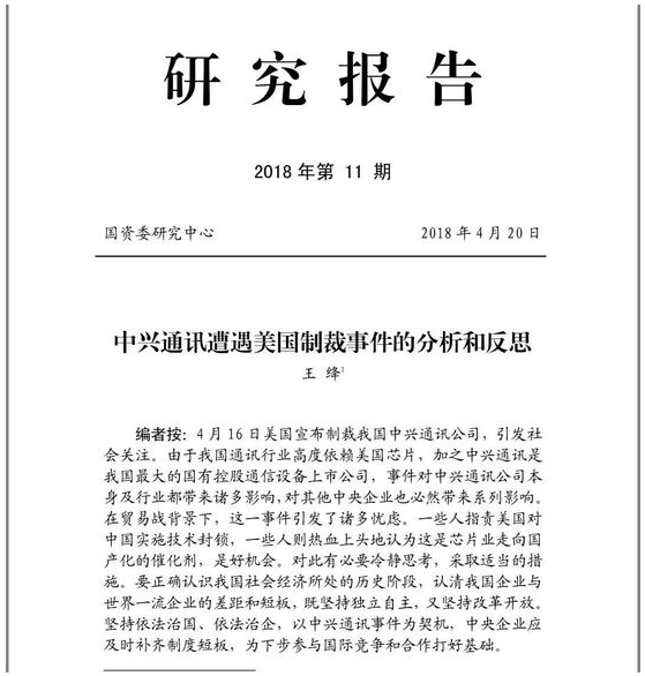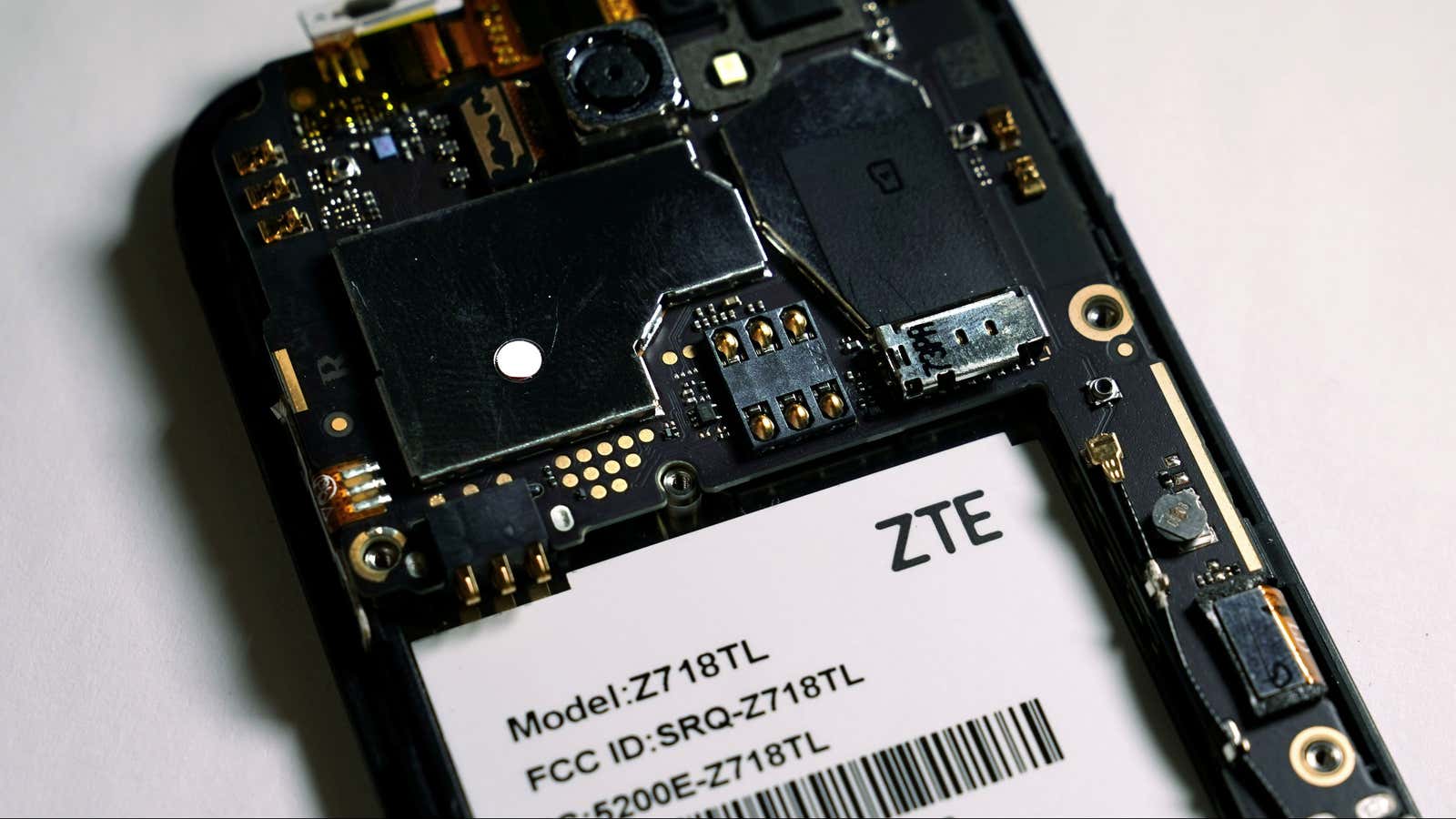As Donald Trump’s trade war with China spread into the tech sector last week, China’s government and state-run media have come out strongly in support of the Chinese tech giants who’ve faced the first volley. An internal government report, however, suggests it’s not entirely sympathetic to the new woes of its telecom giant ZTE.
The US commerce department last week announced it was banning American firms from selling parts and software to ZTE, China’s second-largest telecoms equipment supplier, for seven years (pdf), a move that will severely test the firm in the short-term. The telecom firm pled guilty in March 2017 (pdf) to having shipped equipment to North Korea and Iran in violation of US sanctions, and agreed to pay a $1.2 billion penalty and to punish the employees involved. The US commerce department’s export denial order came after it said it discovered that ZTE had made false statements in relation to the disciplinary actions it had taken, and had paid full bonuses to employees who had engaged in illegal action.
The report from the State-owned Assets Supervision and Administration Commission (SASAC), the top regulator of Chinese state-owned enterprises under China’s cabinet, criticized ZTE’s dealings with the US regulators as “stupid and passive,” and embarrassing to China’s global image. “Many domestic enterprises are paying a terrible price for ZTE’s short-sightedness and dishonesty. Our country’s diplomatic layout and image will inevitably be affected,” said the report, dated April 20.
It also criticized the domestic environment for lacking “social integrity,” and said that in ZTE’s case this spread to its overseas operations.
“Relevant leaders at ZTE Corporation have no legal or confidentiality awareness. They’ve taken risks to engage in illegal operations numerous times. That’s not only related to the broader environment where social integrity in China is not high, but is also an export of the domestic lack of integrity to foreign countries,” the report wrote.
Quartz has asked ZTE about the regulator’s report and will update with any comment. ZTE’s largest shareholder is a state-backed company linked to China Aerospace Science & Industry Corporation (CASIC), a major contractor for China’s space program and missile weapons.
News portal Sina first wrote about the report on April 22, but the article was soon deleted (link in Chinese, cached version). When contacted by Quartz in a phone call, a staffer with SASAC’s research center confirmed that Wang Jiang—who is stated as the author of the report—is affiliated with the center. But the person said she wasn’t in a position to confirm the authenticity of the report. Wang couldn’t be reached directly.

ZTE initially protested the US ban as a threat to its survival. On Sunday (April 22) the company said that it “has learnt from its past experiences on export control compliance” and has taken steps to comply with the order. The commerce department has agreed to ZTE’s request to submit more information (paywall) relating to the case through an informal procedure—it doesn’t have the right to appeal the order to the agency. The Hong Kong-listed company’s shares have been suspended from trading since the US announcement.
The Chinese regulator’s report stands in contrast to more official statements and reactions, which have been overwhelmingly sympathetic to ZTE. The country’s commerce ministry warned the US that by targeting ZTE it will ultimately harm American tech and investment environment. “We hope the US does not try to be too clever, or it will only receive a bitter outcome from what it has done,” said a spokesman with the ministry last week. Meanwhile, patriotic rhetoric has risen in China, with many considering ZTE as a national hero of sorts (link in Chinese). The editor of the hawkish state-run tabloid Global Times declared on his Sina Weibo social media account, “[We] are all ZTE people.”
But the report cited many lapses in ZTE’s operations. The company’s legal team “exists in name only,” the report wrote. When traveling to the US, according to the report, a secretary of ZTE’s chairman once carried a computer with corporate documents about equipment sales to Iran, which was seized by US Customs. “According to our country’s regulations, such confidential materials can never be taken abroad,” the report noted.
Citing ZTE’s connection to the state-run space and military contractor, the report called on the government to come up with a “temporary aid plan” to ensure the US ban won’t cause ripple effects on the country’s military-industrial corporations, along with telecoms, trade, and other firms relating to ZTE. The report also called for the regulator to exert stricter control over Chinese state-owned companies in relation to reporting potential risks relating to their foreign businesses to the agency in a timely manner.
The report did take up one popular refrain though: that the ZTE ban, and the trade war, should be seized as an opportunity for China to catch up with the US in the semiconductor industry—in a level-headed manner. “We must correctly understand our shortcomings, adhering to not only independence but also reforms and opening up. We should use the ZTE incident as a chance to make up the systematic shortcomings of state-owned enterprises, in order to lay a good foundation for future international competition and cooperation,” it wrote.
State media and tech titans like Alibaba’s Jack Ma have also seized on the US action as a chance to make the case that China must reduce its reliance on core foreign technologies—something that Beijing has long been looking to change. In 2015, the government set a goal for Chinese industry to rely on domestic sourcing for 70% of core components and materials by 2025.
